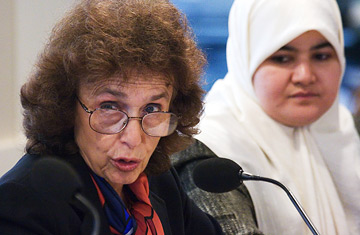
Iran has accused Haleh Esfandiari, a 67-year-old Iranian-American scholar detained in Tehran for the past two weeks, of being linked to a drive funded by Washington aimed at "overthrowing" the country's Islamic rulers.
(2 of 3)
The pro-democracy program is not Tehran's only sore point with the U.S. Apart from the ongoing nuclear controversy, Iran is angry over the continuing detention of five of its diplomats, arrested during a U.S. raid in Iraq in January. There was some speculation that the arrest and interrogation of Esfandiari and other Iranian-Americans may be an attempt to set up a "hostage exchange" — the U.S. citizens in return for the Iranian diplomats. Others speculate that Iranian hard-liners may have instigated the Iranian-American arrests as a means of creating a new diplomatic crisis with the West and thus torpedoing pragmatists in the Iranian government who favor better relations with Washington.
Nevertheless, for the last several months, Iranian officials have publicly charged that the U.S. money is pushing for a "velvet revolution" in Iran. Iranian officials seem to believe that Esfandiari's center is a conduit for the U.S. effort. In interrogations of Esfandiari lasting as long as eight hours, the questions focused almost entirely on her activities at the Wilson Center. The other Iranian-Americans on espionage charges are Kiam Tajbakhsh, of the Open Society Institute, financed by the American billionaire George Soros, who was working with Iranian government ministries on urban projects; and Parnaz Azima, a journalist with Radio Farda, which is funded by the U.S. government. Azima has not been jailed. Ali Shakeri, a member of the Center for Citizen Peacebuilding at the University of California, is reported to be detained but the case against him is unclear.
Akbar Ganji and Emaddeddin Baghi, two of Iran's most prominent pro-democracy activists, who have served long prison sentences for their activities, are among those who protested the U.S. democracy program. In a letter to international human rights organizations after Esfandiari's imprisonment, Baghi denounced the program as morally unjustifiable for effectively putting Iranian activists in harm's way.
Bush's democracy program is opposed even by some exile groups that support a tough U.S. line against the Islamic regime, including a royalist group led by Reza Pahlavi, the son of the deposed shah who seeks to reinstate the monarchy. In an e-mailed comment to TIME, Pahlavi said he "would not accept funds from any foreign governments." He said there were ways to support freedom "without such support coming in the form of governmental funds which invariably ends up hurting those it intends to help by unfairly labeling them as foreign agents."
Several mainstream Iranian reformers tell TIME that from the start they transmitted their opposition to the democracy program indirectly but clearly to American officials via the back-channel talks. Besides warning that it could trigger a crackdown, they argued that Iran's reform movement had strong popular support and did not want or require foreign help. Outside backing has been an unusually sensitive issue in Iranian politics ever since a CIA-backed coup d'etat in 1953 installed the former Shah. Instead, many of them argue, Iran's democracy movement would be better served if the U.S. lifted sanctions and improved relations with Tehran, which would enable trade and cultural links to be expanded. "There is no serious individual inside or outside Iran who is going to take this money," an Iranian reformer told TIME. "Anyone having the slightest knowledge of the domestic political situation in Iran would never have created this program."
